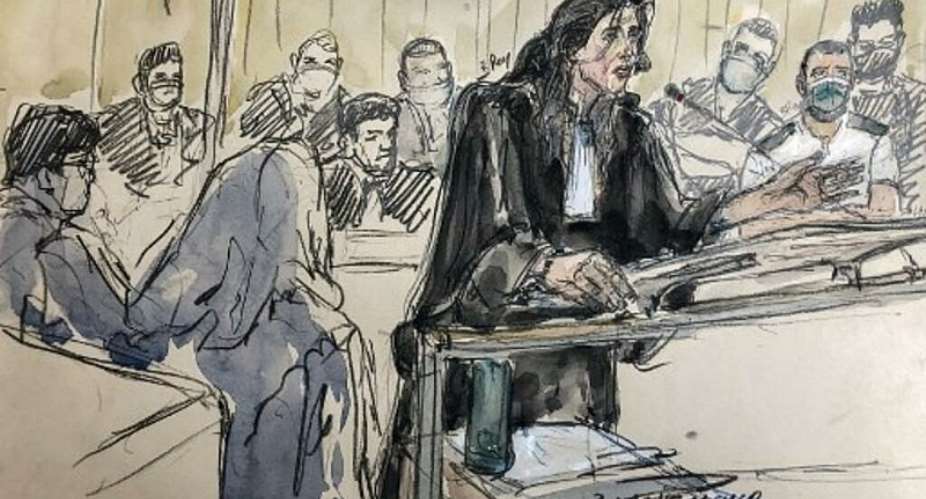On Friday, closing statements in the Paris attacks trial came to an end with pleas from the two lawyers representing Salah Abdeslam, the sole survivor of the terrorist group which caused the deaths of 132 people in the November 2015 massacres.
"Justice has nothing to do with cruelty. It is not intended to please the crowd. If you punish this man as the prosecution demands, terrorism will have won . . . and we'll know that all this has been nothing but a farce."
Olivia Ronen's final words hung in the silence for what seemed a long time before the tribunal president, Jean-Louis Périès, uttered his usual thanks: "Merci Maître".
Ronen and her co-defender, Martin Vettes, spent nearly four hours at the bar on Friday, attempting to save their client, Salah Abdeslam, from literal life imprisonment, the worst punishment permitted under French law.
Their task, in a courtroom packed with surviving victims and those bereaved by the 2015 attacks, was not an easy one. No one likes Salah Abdeslam.
Justice cowering in a bunker
Martin Vettes began the defence by remembering his first impressions of the specially-built courtroom and the extraordinary security precautions put in place for this trial.
"It was like working in a bunker," he said, "surrounded by an army of policemen, snipers, scanners, sniffer dogs, everyone on a war footing. I had the disagreeable feeling that justice was afraid of the light of day."
Vettes was, he continued, rapidly reassured by the attitude of the victims and the bereaved families. "Do your jobs as well as you possibly can," was their clear message to the defence counsel. "Without you, there can be no justice."
And then, after more than nine months of generally serene and serious debate, the prosecution made its demands for punishment, destroying the calm with a chilling lack of mercy, implacable, like the descent of the guillotine.
"The prosecution has been too harsh," lamented Vettes.
He went on to explain the state's demand for the maximum penalty for Salah Abdeslam as a political reaction to public pressure, not as a reasonable legal assessment of the crimes committed.
- Moment of truth for Olivia Ronen as she steps up to defend Salah Abdeslam
- Defence not impressed by prosecution's 'judicial impressionism'
Martin Vettes described his client's clear evolution since his arrest, his shift of position in the course of this trial, his request for forgiveness from the families.
"But no one here wants to believe Salah Abdeslam. His words have no value. And for that, he will spend the rest of his life in jail?
"He has refused to incriminate others, those who are here, the dead. Does that mean he has to pay for their crimes?"
And, quoting the French novelist Romain Gary to the effect that "what we call civilisation may be nothing more than a long effort to fool men about their true natures," Martin Vettes concluded by imploring the tribunal to ensure that their final judgement will "make us all better".
On Monday, each of the 14 accused will be offered a final chance to address the court.
Verdicts are expected on Wednesday evening.





 Ejisu by-election: Aduomi warns NPP against voter intimidation
Ejisu by-election: Aduomi warns NPP against voter intimidation
 High Court orders implicated four NDA officials to present defence
High Court orders implicated four NDA officials to present defence
 Let’s all be matured, patriotic to have a peaceful election this year – Dampare ...
Let’s all be matured, patriotic to have a peaceful election this year – Dampare ...
 Mahama's administration saw thievery that knew no bounds; stole from market wome...
Mahama's administration saw thievery that knew no bounds; stole from market wome...
 GRA/SML deal: Always read the stories behind the headlines or you'd look stupid ...
GRA/SML deal: Always read the stories behind the headlines or you'd look stupid ...
 GRA/SML Contract: It takes some 'wild' boldness for a president to make this dec...
GRA/SML Contract: It takes some 'wild' boldness for a president to make this dec...
 Elisu By-election: "If you call yourself a man, boo Chairman Wontumi again" — Bo...
Elisu By-election: "If you call yourself a man, boo Chairman Wontumi again" — Bo...
 Fuel tanker driver escapes with his life after tanker goes up in flames near Suh...
Fuel tanker driver escapes with his life after tanker goes up in flames near Suh...
 Uniform change: ‘Blue and white are brighter colours’ — Kwasi Kwarteng explains ...
Uniform change: ‘Blue and white are brighter colours’ — Kwasi Kwarteng explains ...
 MoE not changing all public basic school uniforms but only newly built ones — Kw...
MoE not changing all public basic school uniforms but only newly built ones — Kw...
